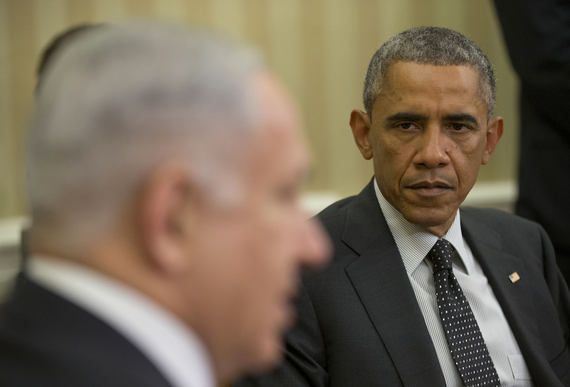Reading the headlines over the past three days, you would be forgiven for thinking that the half-century old strategic relationship between the United States and Israel was collapsing under its own weight. The insults, slights and behind-the-back moves are getting seriously out of hand, and the tempo isn't getting any slower as Israeli Prime Minister Benjamin Netanyahu prepares to come to Washington next week for two major speeches: one in front of AIPAC, and the other in front of a joint session of Congress. The tenor of the discourse on all sides, in Israel and in the U.S., lends further evidence to the obvious conclusion that Bibi has written of the Obama administration for the next two years.
The tit-for-tat is terrible optics for both Netanyahu and Obama, two men who hold many of the same objectives in the Middle East, but frequently clash on the details of how to get there. The U.S.-Israel relationship isn't supposed to be so combative, and if it is, it should be kept behind closed doors. It's certainly fine for longtime friends to disagree (and by friends, I'm not taking about Netanyahu and Obama, but the general relationship at large) on issues of such important magnitude as the Iranian nuclear negotiations and the Mideast peace process (if there still is any), but when those fights start seeping into the press, people naturally come to the assumption that the friendship is deteriorating to a point beyond repair.
Netanyahu, Obama, National Security Adviser Susan Rice, Israeli Defense Minister Moshe Yaalon, House Speaker John Boehner and Secretary of State John Kerry are all guilty one way or another for pitching in to the fight. Speaker Boehner should never have invited Prime Minister Netanyahu to speak to Congress without notifying the Obama administration or the Democratic congressional leadership in advance; Netanyahu's office should not be leaking information selectively to discredit the Iran talks, as the White House alleges; Secretary Kerry shouldn't have humiliated Bibi's judgment during a televised hearing in front of the House Foreign Affairs Committee; Netanyahu should be smarter when dealing with Democratic lawmakers and smoother in navigating the corridors of Washington; and staffers shouldn't be divulging intimate details of private conservations among senior officials to reporters. The fact that everything on this list actually happened, and in full public view, should never have occurred. But, there is no use crying over the past or focusing obsessively on what already happened. The past is the past, and it cannot be undone.
The discussion now should turn to the future: how do we prevent similar attacks from playing out in the media. Given Netanyahu's apparent decision to scoff at the concerns of administration supporters, both inside the White House and in Congress, I'm not sure if this is even possible. But, as people in Washington often say when a crisis jolts everybody into a shock, "something needs to be done."
The Obama administration has insisted all along that their people, both at the National Security Council and at the State Department, are continually briefing and updating the Israeli Government on how the Iran-P5+1 negotiations are proceeding. The Israelis know what the U.S. negotiating stance is, what a final agreement will ultimately look like and how fast U.S., European and international sanctions on Iran's economy will be lifted if Tehran provides the concessions that they need to provide. As an outsider, I have no way of verifying whether this is true (I suspect it is), but if it is, the dialogue needs to continue. If it's not, then this is inexcusable and the administration needs to improve communication skills with their Israeli counterparts. Israel has an understandable fear, more than any other country, of how an Iran armed with a nuclear capability would act in the region, and how that behavior would impact their own national security (Netanyahu has consistently said that a nuclear capable Iran would be an "existential threat" to Israel as a nation). All of the information coming out of Geneva should be given to the Israeli leadership, because they need to know what is going on. Better lines of communication between U.S. and Israeli officials would at least mitigate some of the fear that Netanyahu holds about his team being left in the dark.
More information, of course, means the possibility of more leaks. Therefore, any official who leaks something that is not authorized by the prime minister's office or the White House should be punished and reprimanded (what those punishments should be is another story). Leaking information during the middle of a highly important arms control negotiation is a serious matter, and it should be treated as such. With a few weeks left before the March 31 deadline for an agreement, we don't need another "chickens*it" comment.
Plugging leaks is easier said than done, and I acknowledge that stating the obvious is largely an academic exercise, because there is a high certainty that more unflattering dirty laundry will be aired before and after Netanyahu's address to Congress. There is a lot at stake for the United States and Israel, so tempers are flaring at the moment. And when emotions run high, decisions are often made in the heat of the moment that you wish didn't happen when the temperature cools off.
If plugging the leaks doesn't work, there is always Plan A for Netanyahu and Obama: stop quarreling in the front of the media.

